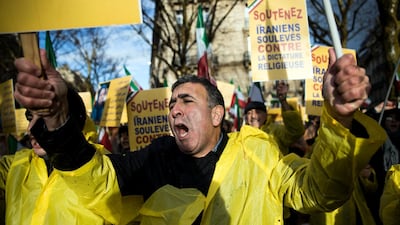Iran said on Thursday that its army was ready to intervene to quell unrest in the country, a day after the Revolutionary Guard chief announced the “end of the sedition”.
Anti-regime protests broke out nationwide last week, during which at least 21 people were killed and hundreds arrested.
“Although this blind sedition was so small that a portion of the police was able to nip it in the bud … you can rest assured that your comrades in the Islamic Republic’s army would be ready to confront the dupes of Great Satan,” Maj Gen Abdolrahim Mousavi was quoted as saying by state media in a reference to the United States.
Gen Mohammed Ali Jafari, head of Iran’s Revolutionary Guard, said on Wednesday that the “sedition” had come to an end after the Guard intervened “in a limited way” against fewer than 15,000 “troublemakers”.
"Today we can announce the end of the sedition," Gen Jafari said, according to the Guard's website.
"A large number of the troublemakers at the centre of the sedition, who received training from counter-revolutionaries … have been arrested and there will be firm action against them."
The White House said it would seek new sanctions against those involved in the crackdown.
The protests that erupted last week in Iran’s second city of Mashhad were initially about economic hardships but quickly spread across the country and turned against the regime. Demonstrators said they were tired of anti-western slogans and that it was time for the clerical leadership and Iranian president Hassan Rouhani to step down.
_______________
Read more: Los Angeles's Iranian community cheers anti-regime protests
_______________
On Thursday, there were no reports of anti-government protests, and a rally in support of the government was held in the city of Mashhad.
It came a day after US president Donald Trump said the Iranian people were attempting to “take back” their government.
"You will see great support from the United States at the appropriate time!" he tweeted on Wednesday.
Iran's United Nations ambassador, Gholamali Khoshroo, meanwhile accused Washington of violating international law and the principles of the UN charter, saying the US government had "stepped up its acts of intervention in a grotesque way in Iran's internal affairs".
Earlier this week, Nikki Haley, the US ambassador to the UN, said Washington was seeking emergency sessions on the situation in Iran at the Security Council in New York and the UN Human Rights Council in Geneva.
On Thursday, Security Council member Russia rejected this, saying such moves were "harmful and destructive".
"Iran's domestic affairs have nothing to do with the UN Security Council's role, [which is the] maintenance of international peace and security," said Russian deputy foreign minister Sergei Ryabkov, according to the Ria news agency.
Also on Turkey, Turkey warned against foreign interferences in Iran’s domestic affairs, saying such behaviour could provoke a backlash.
During a news conference in Ankara, Turkish president Tayyip Erdogan's spokesman, Ibrahim Kalin, also said that while Iranian citizens had the right to hold demonstrations, it was not possible to accept acts that cause casualties and property damage.
________________
Read more:
Iran's protests stem from working-class grievance over price hikes and lack of sanctions relief
Iran regime opponents rally across Europe
________________
The leader of Lebanon's Iran-backed Hizbollah, Hassan Nasrallah, played down the protests as economic discontent, saying they were not rooted in the political issues that spurred huge numbers to demonstrate in 2009 and would end soon.
He described them as "nothing to worry about".
But Iranian Nobel Peace laureate Shirin Ebadi urged the Iranian people to engage in civil disobedience and press on with nationwide protests, which have become the boldest challenge to the leadership since pro-reform unrest in 2009.
Iranians should stay on the street and the constitution given them the right to hold demonstrations, pan-Arab daily Asharq Al Awsat quoted Ms Ebadi as saying.
Ms Ebadi, who is based in London, was awarded the Nobel Peace Prize in 2003 and is one of a number of exiled critics of Iran's leadership. She called on Iranians to stop paying water, gas and electricity bills and taxes.
She also urged them to withdraw their money from state banks to exert economic pressure on the government and so force it to stop resorting to violence and to meet their demands.
"If the government has not listened to you for 38 years, your role has come to ignore what the government says to you now," she said.

